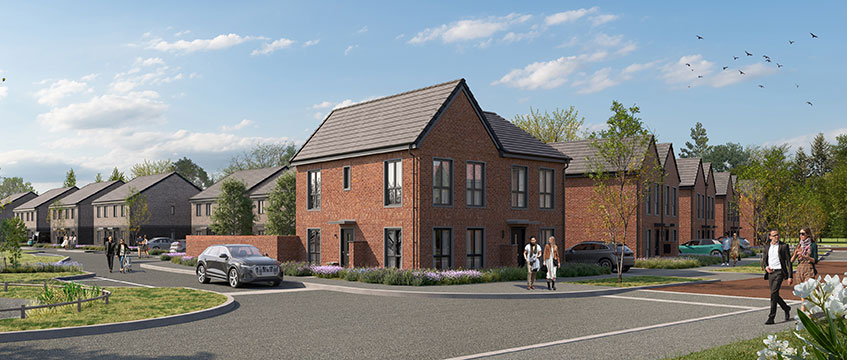Industry players have rallied behind the need to support prefabricated construction to fix both the housing and climate crises as another modular housing company faces collapse.
Ilke Homes this week became the latest developer to file a notice for administration. It hopes to rescue the business through a sale before having to succumb to failure and is in talks with around 15 potential investors.
Ilke’s woes come just a month after L&G set out plans to close its volumetric housing factory in Selby and a year after administrators were appointed to Urban Splash and Sekisui’s modular housing joint venture.
The industry is now urging the government to step in to support modular housebuilders, pointing to enduring challenges around planning consent.
Brendan Geraghty, chief executive of the UK Apartment Association, said it was “unfair to lay the failure of this or any other modular company solely at the feet of the developer”.
“The industry needs to recognise the importance of using modular to deliver better-quality homes and to meet net zero objectives by 2050,” said Geraghty.
“Modular has got to be part of our future, because it is one of the key ways the construction sector will achieve its net zero obligations, both for embodied carbon and carbon in use.”
Challenge looming
Richard Valentine-Selsey, head of European living research at Savills, said it would be easier for modular housebuilders to achieve success in a Help to Buy-style environment, or if the economic picture was healthier and assured better cash flow certainty. The Help to Buy scheme ended earlier this year.
“The challenge is going to be the slowdown in planning pipeline going forward, which is going to put some pressure on construction sites,” added Valentine-Selsey. “With a factory and fixed costs, it is going to affect you more.”
Nick Whitten, head of EMEA and UK living research at JLL, said ilke Homes’ administration reflects how SME housebuilders are the most susceptible to collapse in a period of wider market turmoil.
“The SME housebuilding sector typically bears the brunt of the pain during periods of economic turbulence – and the same is clearly happening again,” he said.
“Construction starts are down by around 20% and housing transactions are down by 30% as a result of all the inflationary-driven headwinds facing the industry. But it is vital the government acts to support the delivery of more energy-efficient housing. Forms of off-site-built homes produce far less waste and lower carbon emissions, and provide a safer environment for construction workers.”
Verity Davidge, director of policy at Make UK Modular, emphasised that modular housing continues to offer a vital solution to fixing the UK’s housing shortage.
Davidge said: “Modular continues to be an important part of the solution to Britain’s burgeoning housing crisis in a sector with a chronic shortage of traditional construction labour. Ultra-low-carbon modular homes are built to slash household bills, utilise state-of-the-art technology and actively move jobs to areas where there is labour available.
“Modular homes are not only greener than traditional new-builds, they can be delivered much more quickly and with low impact on communities – delivered directly to site from advanced manufacturing facilities and adapted in design to suit the local area.”
She added: “All this is increasingly vital as people battle against an unprecedented cost-of-living crisis. Modular should be at the heart of the government’s strategy on housebuilding, providing much-needed extra accommodation across the whole of the UK.”
Planning woes
Rico Wojtulewicz, head of housing and planning policy for the National Federation of Builders and the House Builders Association, underlined that planning continues to block any progress that the modular sector can make.
“This is about volume,” he said. “Factories require contract guarantees, but I think any investor will look at the UK and say, ‘I’m a bit cautious about the UK market.’
“Any sensible investor needs a return on their investment, and that is a very difficult thing to achieve in the UK with the planning system as it is – if you invest in fixing [modular], you [need to] fix the other.”
Wojtulewicz added: “There have been 13 new regulations or taxes added in the past three years, so as a builder or investor it is very difficult to change your business model to adjust to that.”
Some also outlined their belief that L&G and ilke Homes’ respective troubles were individual to those businesses.
Lee Layton, head of operational real estate research at Colliers, cited TopHat as an example of a business that is making modular work.
“We are seeing developers such as TopHat, which has focused on affordable and BTR clients, still having success, and it will be those that have a clear market proposition that will thrive,” Layton said. “This will only become more important as economic conditions continue to be uncertain.”
Layton added: “Despite there still being valid question marks around how well modular construction fits within the traditional build-to-sell models, there are many factors that make it attractive.
“The economies of speed to completion and uniformity are hard to ignore, as are the highly credible ESG credentials of modular housing, all of which make it very attractive to both the BTR and social housing sectors.”
To send feedback, e-mail akanksha.soni@eg.co.uk or tweet @AkankshaEG or @EGPropertyNews











